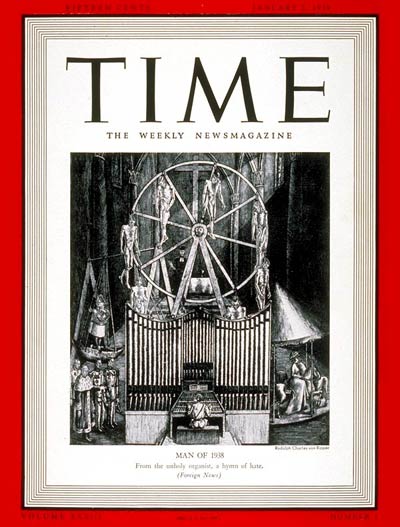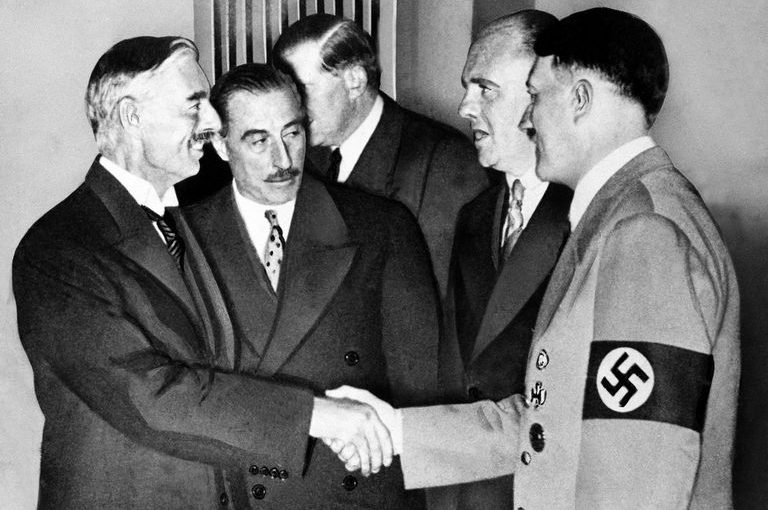Hitler turned closer to home with his home country of Austria. On the 12th of March, he announced his plans to unify Austria with Germany. According to Austrian Chancellor Kurt Alois Josef Johann von Schuschnigg, who was hoping to soothe tensions with Hitler about the Anschluss, Hitler was already good to go on the annexation of Austria when they met in February of 1938.
What is all this nonsense about your independence? Whether Austria is independent or not is not the question. There’s only one thing to discuss. Do you want the Anschluss brought about with bloodshed or without?
Hitler speaking with Schuschnigg
On March 9th, Schuschnigg announced he would hold a referendum on the Anschluss for the 13th. He predicted it would result in a split of around two thirds against the Anschluss. Outraged, Hitler began mobilising for an Austrian invasion the next day and the Chancellor was forced into calling it off and resigning. Only 2 days later, Panzers rolled across the Austrian border unopposed, due to the collapse of the Austrian government.
A referendum was later held that April in which 99.7% of the Austrian people voted in favour of the Anschluss. However the vote was not secret and it is believed that many people were scared to vote against it for fear of being killed. Reminder, this is after the Night of the Long Knives; people knew what Hitler was capable of. After the referendum, anti-semitism was rife in Austria, and around 200 Austrian Jews committed suicide in the weeks following the annexation, fearing a worse fate if they didn’t. It is estimated that, if the election was secret and fair, around 70% would’ve voted against German Annexation. He has the nation of Czechoslovakia surrounded from all 3 sides and he began to look towards the Sudetenland
The country was naturally in an already pretty weak spot. It was bordering a once former and now slowly growing major power, who was very open about wanting to expand its territories. One of its few allies was France, who weren’t exactly enthusiastic about starting another war after losing almost 2 million people in the First World War. Another ally was the USSR, who they did not share a land border with, meaning they would either have to cross through Romania or Poland to assist, both of whom were adamantly against Communism. Czechoslovakia now stood alone as Hitler declared he wanted the Sudetenland, a mountainous region on the German border, that the Czechoslovakian government had just spent quite a sizeable amount of money on forts to defend from their expansionist neighbours. With both their alliances being highly inconvenient, they turned to the UK government for war support. They came back with a less than stellar response.
However much we may sympathise with a small nation confronted by a big and powerful neighbour, we cannot, in all circumstances, undertake to involve the whole British Empire in war simply on her account. If we have to fight, it must be on larger issues than that. I am myself a man of peace to the depths of my soul. Armed conflict between nations is a nightmare to me. But if I were convinced that any nation had made up its mind to dominate the world by fear of its force, I should feel that it should be resisted. And that such a domination like the people who believe in liberty, would not be worth living. But war is a fearful thing, and we must be very clear before we embark on it, that it is really the great issues that are at stake, and that a call to risk everything in their defense, when all the consequences are weighed, is irresistible.
Chamberlain’s statement on Czechoslovakia
With central European tensions rising and war on the horizon, France and Britain decided to host a peace conference with Germany, with Italy as a mediator. Czechoslovakian officials were not invited. At the conference, Germany was given everything that they wanted, just as long as they promised to not take any more land, not just in Czechoslovakia, but across Europe.

Satisfied, Chamberlain returned home, waving the contract off of a plane, declaring “peace in our time”. Because of the summit, Hitler was selected for Time magazine’s Man of the Year award in 1938.

The Czechoslovakians had now lost their major forts and Hungary, seeing an opportunity, took lower parts of Slovakia. A now even weaker Czechoslovakia, with no more allies, was powerless to stop Hitler from backing an independence bid for Slovakia, effectively setting it up as a puppet state, before Hungary took a little bit more of the tip of Slovakia. With the majority of their defences, industry and population gone, Czechoslovakia had no choice but to bow down to German oppression and was turned into a protectorate.
Memel is a much shorter story for a much smaller piece of land. Hitler simply sent an ultimatum to Lithuania, who had around 20,000 men, compared to Germany’s bordering a million men and Lithuania was forced into conceding Memelland, a former territory of Imperial Germany.
